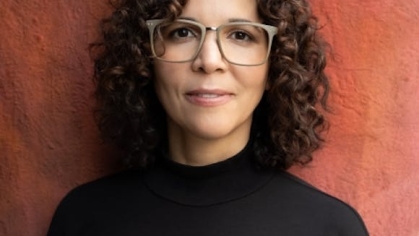As a graduate student in Newark, Brenda Hopper realized the significance of small businesses. As head of the state's Small Business Development Center, the Rutgers MBA alumna made a career of being their champion.
Brenda Hopper’s 8th floor corner office looks over many of the City of Newark’s iconic landmarks – the Colonnade apartment towers, glimpses of the trees in Branch Brook Park, a portion of Route 280, the Broad Street train station, the lot where the old Westinghouse building once stood. She can see the construction of new buildings and the resurrection of a city’s once struggling, though now blossoming business district.
"That whole skyline has changed. To see all this activity—the cranes, the buildings, the growth—it’s just unbelievable. I’m so happy to be a part of it. I still look forward to coming to work, to do what I do," said Hopper, a 1976 Rutgers MBA alumna who has worked as state director and chief executive officer of the New Jersey Small Business Development Centers (NJSBDC) for more than 25 years.
Hopper’s history with Rutgers Business School and the City of Newark runs deep. Her family moved to Newark from North Carolina while she was a child and she went through the Newark Public School system. Eventually she graduated and worked for Prudential Insurance Company before starting her undergraduate degree. Hopper graduated from Rutgers University-Newark in 1974 with a bachelor’s degree in economics and business.
Unsure of which professional path to take after earning her undergraduate degree, Hopper spoke with one of her professors and mentors, Richard Marshall—a real estate professor and one of few black professors at the time—who encouraged her to "do something different" and pursue a career in business. Armed with that encouragement, Brenda began her finance and marketing MBA at Rutgers Business School, known at the time as the Rutgers Graduate School of Management.
Her time as a Rutgers MBA student was gratifying but challenging. A single mother with a young son at the time, Hopper worked during the day and studied at night and credits her mother for the strong support system she needed to get through school. She was also one of a small group of black students, and women, getting an MBA, and the support provided by that small group of peers—a group organized by Alfreda Robinson, former Assistant Dean of Admissions and Financial Aid, and a champion of minority MBA students—was also critical. "I will tell you, I was ready to quit. But we had such a tight study group, that we all encouraged and helped each other," she said. "I (said) 'OK, I can’t do this. I’m tired, trying to study, trying to work—but that’s when the encouragement of this group of students helped propel me towards graduation.'"
Because of these experiences, Hopper says she can relate to students—minorities, women, mothers—and strives to be as supportive as her network was to her. "You want to nurture (students). You want to tell them that we’re here if it gets too hard. We’re here to help you,” Hopper said.
Even as a student, Hopper was involved with small business initiatives. While earning her MBA, she interned at the Rutgers Minority Investment Company, an SBA-sponsored program that existed at the time. Here she worked with Newark’s local business owners, helping them reopen and grow businesses that were still suffering from the trauma of the Newark riots several years before. Hopper recalled that time during and then after the 1967 riots. "Newark was burning. You had small businesses that had lost everything–vibrant small businesses–cleaners, supermarkets, restaurants that were no longer there.”
After graduating with her MBA, Hopper worked for several years in sales at IBM, but soon found herself again working in small business and economic development. In 1991, she got the call to head the NJSBDC statewide network, headquartered at Rutgers Business School in Newark. Hopper has been here since.
The NJSBDC network is part of America’s Small Business Development Centers. America’s SBDC is a public-private educational partnership uniting private enterprise, government, higher education and local nonprofit economic development organizations. The U.S. Small Business Administration (SBA) is the NJSBDC’s primary grantor. The NJSBDC acts as the SBA’s largest technical assistance partnership program and is supported by New Jersey’s Business Action Center (NJBAC). The network provides management and technical assistance to, and advocates for, New Jersey’s small businesses and entrepreneurs allowing them to efficiently and confidently start, run and grow their own businesses, while increasing the strength of local economies throughout the state. The NJSBDC network has 12 regional centers and more than 20 affiliate offices located at universities and colleges across New Jersey – all of which provides no-cost, one-to-one counseling and training by expert business advisers.
Why dedicate her life’s work to helping small businesses succeed and grow? "I saw an opportunity to make a real difference," Hopper said.
Her colleagues agree.
"Under Brenda's direction, the NJSBDC has grown and thrived throughout her 25 year tenure," said U.S. Small Business Administration’s (SBA) Project Officer Harry Menta. "I have always admired Brenda's approach to leadership. She is confident and passionate about the mission of serving the New Jersey small business community and that is reflected in the delivery of the programs and services provided by the network of 12 regional centers she manages. She is a true asset in the partnership that the SBA and NJSBDC share."
Hopper’s team at the NJSBDC office in Newark sees her passion in action daily.
Igor Arnold, director of management information systems for the NJSBDC, has worked with Brenda since 1993. Hopper is "enthusiastic" about the work the center does, Arnold said. "She really feels the mission—both for the country and for local development," he said. "She feels like the SBDC can have a real impact on the community, especially inner-city communities."
For Hopper, working with the state’s small businesses has paid back in gratifying dividends. "I see it when I'm walking on Halsey Street. I actually see businesses that the Rutgers Newark SBDC worked with," she said. "I see these businesses flourishing near my home and by the statehouse in Trenton, down the shore in Asbury Park, up in Jersey City and Fort Lee and at the southern end of the state near Rutgers Camden’s campus. It’s amazing that this is a part of what we do and the effects stretch so far. I’m very proud of that.”
Hopper said her Rutgers MBA has proved to be vital to her work. "My Rutgers MBA actually prepared me to do the job I’m doing,” Hopper said. It equipped her with knowledge in finance and marketing, business planning, budget projections and financing–all of which comes to bear on her interactions with and advocacy for small business clients. As she began working with small businesses, Hopper said everything she learned in the classroom started to make sense. "I was prepared [for the job] because I understood what businesses and entrepreneurs needed to succeed."
- Vanessa Roman


